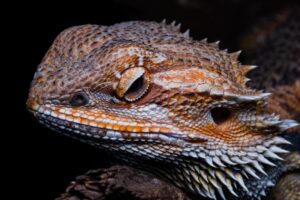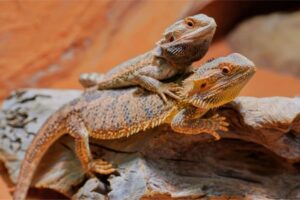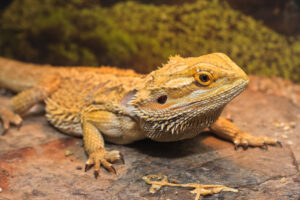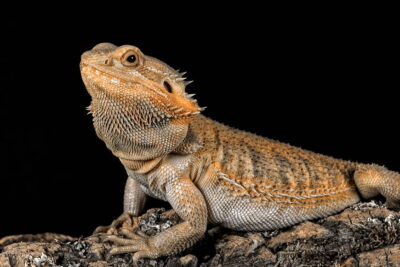As beloved reptilian companions, bearded dragons require a carefully curated diet to thrive in captivity. Among the essential components of their nutrition are insects, serving as a vital protein source and offering enrichment through natural hunting behaviors.
However, not all bugs are created equal when it comes to meeting the dietary needs of these majestic creatures. In this guide, we delve into the world of the “best bugs for bearded dragons,” uncovering the most nutritious, readily available, and safe options to ensure optimal health and vitality for your scaly friend.
Role of insects in a bearded dragon’s diet

Insects play a crucial role in a bearded dragon’s diet, providing essential nutrients and contributing to their overall health and well-being. Here’s a breakdown of the key roles insects play:
- Protein Source: Bearded dragons are omnivores, meaning they require a combination of animal and plant-based foods. Insects are a primary source of high-quality protein for these reptiles, aiding in muscle development, growth, and repair.
- Nutrient Variety: Different insects offer a diverse array of nutrients, including vitamins, minerals, and amino acids, which are vital for various bodily functions such as metabolism, immune system function, and bone health. By incorporating a variety of insects into their diet, bearded dragons can access a broader range of essential nutrients.
- Enrichment and Mental Stimulation: Hunting for insects provides bearded dragons with mental stimulation and enrichment, mimicking their natural hunting instincts. This activity not only keeps them physically active but also engages their minds, promoting overall well-being and reducing boredom.
- Promoting Natural Behaviors: In the wild, bearded dragons spend a significant amount of time foraging for food, including insects. By including insects in their diet, owners can encourage natural behaviors, helping their pets maintain a sense of normalcy and fulfillment in captivity.
- Gut Health: Some insects, such as certain species of worms and insects with a high chitin content, can contribute to gut health by aiding in digestion and providing fiber. A balanced diet that includes a variety of insects helps support a healthy digestive system in bearded dragons.
Overall, insects are indispensable components of a bearded dragon’s diet, offering essential nutrients, promoting natural behaviors, and contributing to their overall health and happiness. However, it’s crucial to ensure that the insects offered are appropriate in size, species, and nutritional content to meet the specific dietary needs of these reptiles.
Criteria for selecting the best bugs
When selecting the best bugs for your bearded dragon, consider the following criteria to ensure optimal nutrition and safety:
- Nutritional Content: Choose insects that are high in protein and low in fat. Additionally, look for bugs rich in essential vitamins and minerals such as calcium and vitamin D3, which are crucial for bone health and overall well-being.
- Appropriate Size: Select insects that are an appropriate size for your bearded dragon’s age and size. Avoid offering insects that are too large, as they may pose a choking hazard, and opt for smaller prey that can be easily consumed.
- Gut Loading: Feed insects a nutritious diet before offering them to your bearded dragon. This process, known as gut loading, enhances the nutritional value of the insects and ensures that your pet receives maximum benefit from their prey.
- Variety: Offer a variety of insects to provide a diverse range of nutrients and prevent dietary deficiencies. Different insects offer unique nutritional profiles, so rotating between species ensures a well-rounded diet for your bearded dragon.
- Safety: Avoid offering insects that have been exposed to pesticides, herbicides, or other harmful chemicals. Additionally, only collect insects from areas free of pollution and contaminants to ensure the safety of your pet.
- Digestibility: Choose insects that are easily digestible for bearded dragons. Some insects, such as mealworms, have tough exoskeletons that may be difficult for reptiles to digest, while others, like crickets and dubia roaches, are more readily digestible.
- Allergies and Sensitivities: Be mindful of any allergies or sensitivities your bearded dragon may have to certain insects. Monitor your pet for any adverse reactions after introducing new prey items and adjust their diet accordingly.
By considering these criteria when selecting bugs for your bearded dragon’s diet, you can ensure that they receive the optimal nutrition and care they need to thrive in captivity.
30 Best bugs for bearded dragons

Here’s a list of 30 commonly available insects suitable for bearded dragons, along with their benefits:
- Crickets: High in protein and readily available, crickets are a staple insect for bearded dragons. They provide essential nutrients for growth and energy.
- Dubia Roaches: Nutrient-rich and easy to digest, Dubia roaches offer a balanced diet for bearded dragons while being low in fat.
- Mealworms: Rich in protein and readily accepted by bearded dragons, mealworms are a popular choice. However, they should be fed in moderation due to their tough exoskeleton.
- Superworms: Larger than mealworms, superworms are a good protein source for adult bearded dragons. They should be offered sparingly and only to larger reptiles due to their size.
- Black Soldier Fly Larvae (Phoenix Worms): High in calcium and low in fat, Phoenix worms are excellent for calcium supplementation in bearded dragons, aiding in bone health.
- Silkworms: Soft-bodied and highly nutritious, silkworms are gentle on the digestive system and rich in protein, making them an ideal choice for young or sick bearded dragons.
- Hornworms: With a high moisture content, hornworms are hydrating and nutritious for bearded dragons. They also contain beneficial nutrients such as calcium and vitamins.
- Butterworms: Rich in calcium and low in fat, butterworms are a tasty treat for bearded dragons. They can be fed occasionally to add variety to their diet.
- Waxworms: High in fat, waxworms are best offered as an occasional treat for bearded dragons due to their lower nutritional value. They are enticing and can encourage feeding in picky eaters.
- Red Runner Roaches: Similar to Dubia roaches, red runner roaches are a nutritious option for bearded dragons, providing essential protein and vitamins.
- Earthworms: Rich in protein and easy to digest, earthworms are a natural and nutritious option for bearded dragons. They can be offered occasionally as part of a varied diet.
- Blue Bottle Fly Larvae (Blue Bottle Flies): High in protein and calcium, blue bottle fly larvae are beneficial for bearded dragons. They are also easy to digest and readily accepted.
- Hissing Cockroaches: While less common, hissing cockroaches are nutritious and easy to breed. They provide essential nutrients for bearded dragons and can be offered as part of a varied diet.
- Locusts: With a good balance of protein and fiber, locusts are suitable for bearded dragons. They are also low in fat, making them a healthy option for regular feeding.
- Fruit Flies (Flightless): Small and easily digestible, flightless fruit flies are ideal for young bearded dragons or those with smaller appetites. They provide essential nutrients without overwhelming smaller reptiles.
- Giant Mealworms: Larger than regular mealworms, giant mealworms are suitable for adult bearded dragons. They should be offered sparingly due to their tough exoskeleton.
- Silkworm Pupae: Before they become adult moths, silkworm pupae are rich in nutrients and protein, making them a nutritious treat for bearded dragons.
- Grasshoppers: Rich in protein and fiber, grasshoppers are a natural prey item for bearded dragons. They can be offered occasionally to add variety to their diet.
- Black Crickets: Similar to regular crickets, black crickets are a nutritious option for bearded dragons. They provide essential protein and vitamins for growth and development.
- Woodlice (Isopods): While small, woodlice are rich in calcium and other essential nutrients. They can be offered as part of a varied diet for bearded dragons.
- Dermaptera (Earwigs): Rich in protein and fiber, earwigs are a natural prey item for bearded dragons. They can be offered occasionally to add variety to their diet.
- Stick Insects (Stick Bugs): While less common, stick insects are rich in protein and fiber. They can be offered as an occasional treat for bearded dragons to promote natural hunting behaviors.
- Moths: While primarily nocturnal, moths are rich in protein and can be offered to bearded dragons as an occasional treat. However, ensure they are obtained from pesticide-free environments.
- June Bugs: Rich in protein and easily digestible, June bugs are a natural prey item for bearded dragons. They can be offered occasionally as part of a varied diet.
- Shield Bugs (Stink Bugs): While less common, shield bugs are rich in protein and fiber. They can be offered as an occasional treat for bearded dragons to add variety to their diet.
- Pill Bugs (Roly-Polies): Rich in calcium and other essential nutrients, pill bugs are a nutritious option for bearded dragons. They can be offered as part of a varied diet.
- Snails: While less common, snails are rich in protein and calcium. They can be offered as an occasional treat for bearded dragons to promote natural foraging behaviors.
- Beetles: While some species may contain toxins, certain beetles are safe and nutritious for bearded dragons. They can be offered as an occasional treat to add variety to their diet.
- Ants: Small and rich in protein, ants can be offered to bearded dragons as an occasional treat. However, ensure they are obtained from pesticide-free environments.
- Dragonfly Nymphs: Rich in protein and fiber, dragonfly nymphs are a natural prey item for bearded dragons. They can be offered occasionally to add variety to their diet.
Each of these insects provides unique benefits for bearded dragons, including essential nutrients such as protein, calcium, and vitamins, while promoting natural hunting behaviors and offering variety in their diet. When feeding insects to your bearded dragon, it’s essential to ensure they are appropriately sized, gut-loaded, and sourced from reputable suppliers to maintain your pet’s health and well-being.
Feeding tips and considerations

Feeding your bearded dragon a balanced diet is crucial for its health and well-being. Here are some feeding tips and considerations to keep in mind:
- Variety is Key: Offer a diverse range of insects, leafy greens, vegetables, and fruits to ensure your bearded dragon receives a well-rounded diet. Variety not only provides essential nutrients but also keeps mealtime interesting for your pet.
- Protein to Plant Ratio: Bearded dragons require a diet that consists of approximately 70-80% insects and 20-30% vegetables and greens. Adjust the ratio based on your dragon’s age, size, and activity level.
- Feed Appropriately Sized Prey: Offer insects that are no larger than the space between your bearded dragon’s eyes to prevent choking or impaction. For young dragons, opt for smaller prey items, gradually increasing the size as they grow.
- Gut Loading and Supplementation: Gut load insects with nutritious foods such as leafy greens, vegetables, and commercial gut-loading diets before offering them to your bearded dragon. Additionally, dust insects with calcium and vitamin D3 supplements to prevent deficiencies.
- Hydration: Ensure your bearded dragon has access to fresh water at all times. Additionally, provide regular baths to help with hydration and aid in shedding.
- Monitor Eating Habits: Keep an eye on your bearded dragon’s eating habits and adjust their diet as needed. Changes in appetite or weight loss could indicate health issues that require veterinary attention.
- Avoid Toxic Foods: Some foods, such as avocado, rhubarb, and certain types of insects, are toxic to bearded dragons and should be avoided. Familiarize yourself with safe and toxic foods to prevent accidental ingestion.
- Natural Sunlight or UVB Lighting: Bearded dragons require UVB light to metabolize calcium properly. Provide access to natural sunlight or use UVB lighting in their habitat to ensure they receive adequate UVB exposure.
- Feeding Schedule: Offer insects to juvenile bearded dragons daily and adjust to every other day or every few days as they mature. Adult bearded dragons can be fed insects 2-3 times per week, with vegetables and greens offered daily.
- Observe Defecation: Regular bowel movements are a sign of a healthy digestive system. Monitor your bearded dragon’s feces for consistency, color, and frequency, as changes could indicate underlying health issues.
By following these feeding tips and considerations, you can provide your bearded dragon with a balanced and nutritious diet that supports their health, growth, and overall well-being. If you have any concerns about your dragon’s diet or health, consult with a reptile veterinarian for guidance and support.
Avoiding wild-caught insects due to risk of pesticides or parasites
Avoiding wild-caught insects for your bearded dragon is a wise precaution due to the potential risks associated with pesticides, parasites, and other contaminants. Here are some reasons why it’s best to opt for commercially bred insects:
- Pesticide Exposure: Insects collected from the wild may have come into contact with pesticides, herbicides, or other chemical contaminants present in their natural environment. These chemicals can be harmful or even toxic to your bearded dragon if ingested.
- Parasite Transmission: Wild-caught insects may carry parasites, such as mites, ticks, or internal worms, which can be transmitted to your bearded dragon upon ingestion. Parasite infestations can lead to health issues and may require veterinary treatment to resolve.
- Nutritional Consistency: Commercially bred insects are often raised in controlled environments and fed high-quality diets, ensuring they have optimal nutritional value for your bearded dragon. In contrast, the nutritional content of wild-caught insects can vary widely depending on factors such as their diet and habitat.
- Convenience and Accessibility: Purchasing insects from reputable suppliers or breeding them yourself provides a convenient and reliable source of food for your bearded dragon. This eliminates the need to spend time and effort collecting insects from the wild, which may not always be readily available or suitable for feeding.
- Health and Safety: Feeding commercially bred insects reduces the risk of exposing your bearded dragon to potential pathogens or contaminants present in the wild. By choosing insects from trusted sources, you can help safeguard your pet’s health and well-being.
To ensure the safety and nutrition of your bearded dragon’s diet, it’s best to purchase insects from reputable pet stores, online suppliers, or breed them yourself using proper husbandry practices. Additionally, always inspect insects for signs of illness or contamination before feeding them to your bearded dragon, and wash them thoroughly if necessary.
By taking these precautions, you can provide your pet with a healthy and balanced diet while minimizing the risks associated with wild-caught insects.

